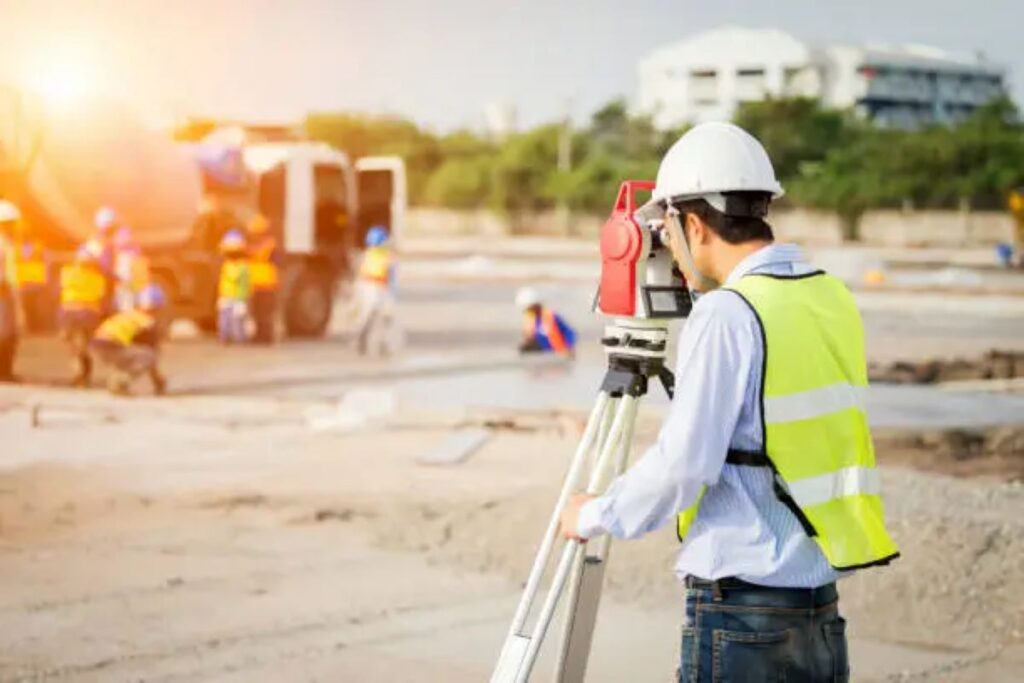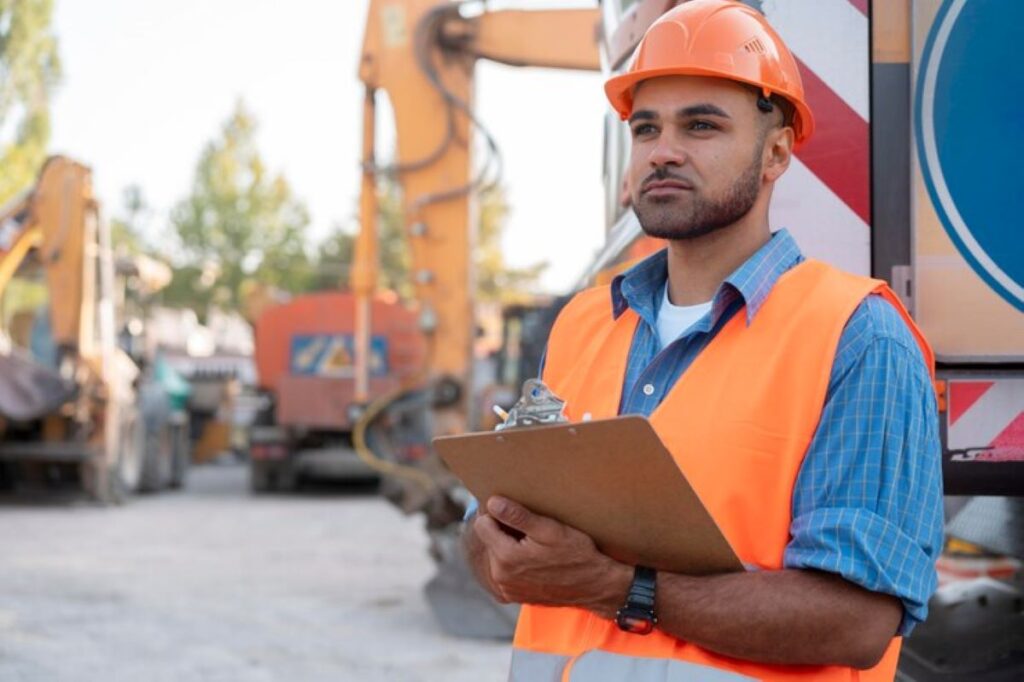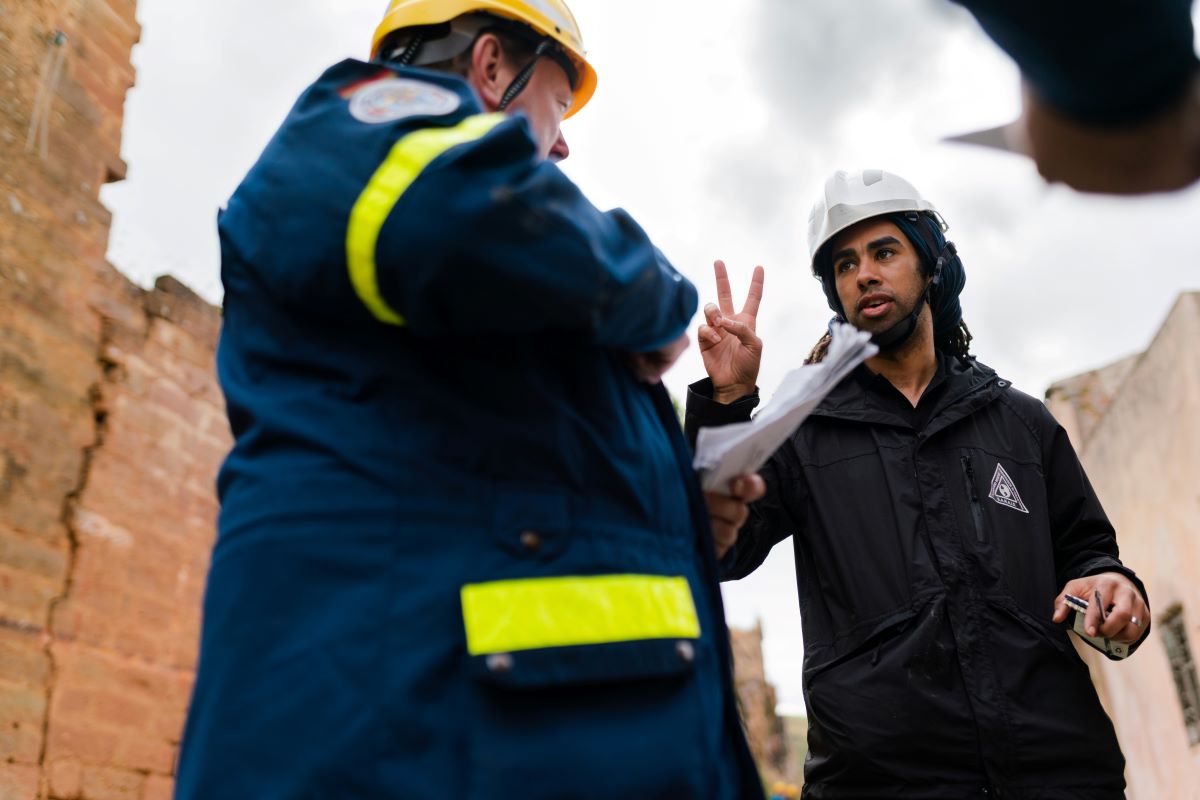The Role of Survey Engineers in Enhancing Project Accuracy
Survey engineers are essential to the success of civil engineering projects. They provide crucial spatial data and measurements that are necessary for construction and infrastructure development. Their knowledge and skills have a direct impact on project results by providing accurate measurements and thorough analysis of the land and site conditions.
Key Functions in Project Accuracy:
- Establishing accurate boundary lines and property measurements
- Creating detailed topographic maps for site planning
- Determining exact positions for structural elements
- Verifying construction alignment with design specifications
- Monitoring ground movement and structural settlement
The precision delivered by survey engineers prevents costly errors and potential safety hazards in construction projects. A misplacement of just a few centimetres can result in significant structural issues, legal disputes, or project delays.
Critical Responsibilities:
- Implementation of rigorous measurement protocols
- Selection of appropriate surveying methods and equipment
- Documentation of site conditions and spatial relationships
- Coordination with project stakeholders
- Quality assurance of surveying data
Survey engineers use their expertise in mathematics, geometry, and advanced technology to ensure measurements meet industry standards. Their work goes beyond initial site surveys to include ongoing project monitoring and final verification of completed works, ensuring adherence to design specifications throughout the project lifecycle.
Comprehensive Services Provided by Survey Engineers
Survey engineers deliver a diverse range of specialised services through registered surveyors, utility locators, and dedicated project management teams. These services create a robust foundation for successful infrastructure and construction projects.
Registered Surveyors’ End-to-End Solutions:
- Property boundary determinations
- Construction layout and set-out
- Infrastructure mapping
- Volumetric calculations
- As-built documentation
Utility Location Services:
- Underground asset detection
- 3D mapping of subsurface utilities
- Non-destructive digging
- Real-time utility marking
- Detailed utility reports
The Wumara Group extends these core surveying capabilities with additional specialised services:
Site Investigation Management
- Geotechnical assessments
- Environmental impact studies
- Risk analysis and mitigation
- Project timeline coordination
- Resource allocation
Indigenous Procurement Consulting
- Cultural heritage preservation
- Community engagement strategies
- Local workforce development
- Supply chain integration
- Tender preparation support
These comprehensive services support major telecommunications projects for clients including CI International, City of Sydney Council, Telstra, and NBN. The integration of traditional surveying expertise with modern project management and cultural considerations ensures precise, efficient project delivery while maintaining respect for Indigenous heritage and community values.
Market Presence and Client Satisfaction of Survey Engineers
Survey engineering firms have established a strong presence along Australia’s eastern coastline, with significant operations in New South Wales and Queensland. These strategic locations enable survey engineers to serve various industries, including telecommunications, infrastructure, and government projects.
Feedback from Clients
Client testimonials highlight exceptional service delivery across multiple parameters:
- Responsiveness: Quick turnaround times for project queries and urgent requirements
- Professional Approach: Demonstrated expertise in handling complex surveying challenges
- Value Delivery: Competitive pricing structures with negotiable rates based on project scope
- Service Quality: Consistent delivery of accurate, reliable survey data
Recent Successful Collaborations
Recent successful collaborations include:
- Telecommunications sector partnerships with:
- CI International
- City of Sydney Council
- Telstra
- NBN
- Government sector engagement:
- School Infrastructure NSW (SINSW) state projects
- Local council developments
The growing client portfolio spans both private and public sectors, demonstrating the versatility and reliability of survey engineering services. Client satisfaction metrics consistently show high ratings for technical competence and project management capabilities, reinforcing the industry’s commitment to excellence in service delivery.
Survey engineers are also playing a crucial role in disaster risk reduction, leveraging their expertise to provide critical data that aids in planning and implementing effective risk management strategies.
Utilisation of Advanced Technologies by Survey Engineers for Enhanced Accuracy
Modern survey engineering relies heavily on cutting-edge technology to achieve unprecedented levels of precision. The integration of advanced surveying equipment has revolutionised data collection and analysis processes:
Essential Advanced Technologies:
- Drone Photogrammetry: Captures high-resolution aerial imagery for detailed site mapping
- 3D Laser Scanning: Creates precise point clouds for accurate spatial measurements
- GPS/GNSS Systems: Delivers centimetre-level positioning accuracy
- Robotic Total Stations: Enables automated tracking and measurement capabilities
- 3D Modelling Software: Transforms raw data into detailed digital terrain models
Regular calibration stands as a critical component in maintaining equipment accuracy. Survey engineers implement strict calibration schedules:
Calibration Requirements:
- Daily instrument checks before field operations
- Weekly baseline measurements
- Monthly comprehensive system diagnostics
- Quarterly professional calibration services
- Annual certification renewals
These advanced technologies, combined with rigorous calibration protocols, enable survey engineers to:
- Reduce human error
- Increase data collection speed
- Enhance measurement precision
- Improve project deliverable quality
- Generate comprehensive digital records
The integration of these sophisticated tools requires extensive training and expertise. Survey engineers must stay current with technological advancements through continuous professional development and practical application in the field.
Practices Adopted by Survey Engineers to Ensure Accuracy in Their Work
Survey engineers implement rigorous quality control measures to maintain exceptional accuracy standards in their work. These practices include:
Data Cross-Referencing
- Multiple measurement comparisons from different control points
- Verification of coordinates against existing survey records
- Cross-checking of field measurements with digital data
- Documentation of discrepancies and resolution methods
Field Check Protocols
- Pre-survey equipment calibration and testing
- Systematic observation recording
- Redundant measurements for critical points
- Weather condition monitoring and compensation
Survey engineers strictly adhere to industry standards set by professional bodies and regulatory authorities. These standards encompass:
Measurement Specifications
- Minimum angular accuracy requirements
- Distance measurement tolerances
- Vertical control specifications
- Boundary determination procedures
Documentation Requirements
- Detailed field notes
- Survey control diagrams
- Equipment calibration records
- Data processing methodology
The implementation of these practices ensures reliable survey data through systematic error detection and correction. Survey engineers maintain comprehensive quality management systems, incorporating regular peer reviews and independent checks of calculations and measurements.

Integration of Various Disciplines in Modern Civil Surveying for Accurate Project Delivery Speed
Modern civil surveying projects require a collaborative approach involving multiple fields of expertise to achieve the highest level of precision and effectiveness. By combining different specialised surveying areas, a complete system is established that ensures successful project outcomes.
1. Construction Surveying
Construction surveying plays a crucial role in ensuring that structures are built according to plan. It involves:
- Precise layout and positioning of structural elements
- Real-time monitoring of construction progress
- Verification of as-built conditions against design specifications
- Dimensional control for complex architectural features
2. Geological Surveys
Understanding the geological characteristics of a site is essential for any construction project. Geological surveys involve:
- Assessment of ground stability and soil conditions
- Identification of potential hazards and geological constraints
- Analysis of subsurface formations
- Documentation of rock structures and mineral deposits
3. Topographic Analysis
Topographic analysis provides critical information about the land’s physical features. It includes:
- Detailed mapping of terrain features and elevations
- Creation of 3D surface models
- Drainage pattern assessment
- Site accessibility evaluation
The collaboration between these various disciplines allows survey engineers to:
- Identify potential conflicts early in the project lifecycle
- Optimise resource allocation
- Minimise project delays through coordinated data collection
- Improve decision-making with comprehensive site information
This integrated approach has proven particularly valuable in complex infrastructure projects, such as the telecommunications sector work undertaken for CI International and the NBN, where multiple surveying disciplines must work together seamlessly to deliver accurate results within tight deadlines.
Technological Advancements Driving Accuracy Improvements in Surveying Practices
Modern surveying practices have undergone significant transformation through cutting-edge technological innovations. These advancements deliver unprecedented levels of precision and efficiency in data collection and analysis.
CAD Software Integration
Advanced Computer-Aided Design software enables survey engineers to create detailed digital representations of surveyed areas. The software’s capability to process complex calculations and generate 3D models has revolutionised project planning and execution phases.
Aerial Photogrammetry Revolution
Drone-based aerial photogrammetry has transformed site documentation:
- Captures high-resolution imagery from multiple angles
- Creates accurate terrain models
- Reduces time spent on ground surveys
- Enables access to challenging terrains
LiDAR Scanning Technology
Light Detection and Ranging (LiDAR) technology represents a quantum leap in surveying accuracy:
- Generates precise point clouds with millimetre-level accuracy
- Maps large areas efficiently
- Penetrates vegetation for ground-level measurements
- Produces detailed 3D visualisations
These technological tools have redefined traditional surveying methods. Survey engineers now process vast amounts of data with greater speed and precision. The integration of these advanced systems has minimised human error, streamlined workflows, and enhanced project deliverables.
The combination of these technologies allows survey engineers to tackle complex projects with increased confidence. Real-time data processing capabilities enable quick decision-making and immediate problem resolution on-site.

Conclusion
Survey engineers are essential for project success because of their skill in providing accurate geographic information. Their careful method of gathering, analysing, and applying data establishes a strong base for construction, infrastructure, and development projects.
The combination of advanced technology with traditional surveying techniques has transformed the industry, allowing survey engineers to:
- Achieve unprecedented levels of precision
- Shorten project timelines
- Reduce expensive mistakes
- Improve decision-making processes
Survey engineers’ knowledge goes beyond simple measurements – it includes a thorough understanding of spatial relationships, legal requirements, and project-specific obstacles. Their capability to offer precise geographic information is invaluable across various industries, including telecommunications infrastructure and government initiatives.
The ongoing advancement of surveying methods, along with strict quality control measures, guarantees that survey engineers continue to play a vital role in shaping the future of construction and development projects by providing dependable data that serves as the foundation for successful project results.
Related : Why Engineering Surveyors Are Key to Construction Success

